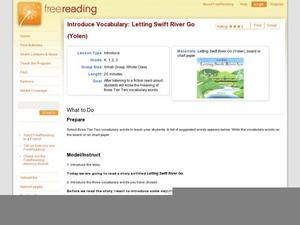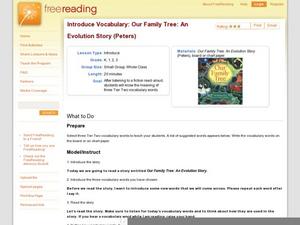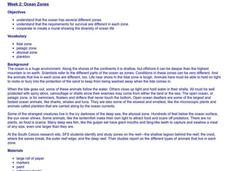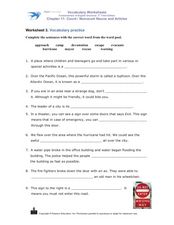Scholastic
Study Jams! The Ocean Floor
Under the sea, the geography is as varied as it is on land! Young oceanographers find out about continental shelves, abyssal plains, seamounts, trenches, and mid-ocean ridges by viewing and reading the eight high-quality slides. Then...
NOAA
A Day in the Life of an Ocean Explorer
What's life like aboard an ocean exploration vessel? Junior oceanographers examine the important role of communication in ocean research in lesson two of a five-part series from NOAA. The materials introduce the class to life on board...
Curated OER
Introduce Vocabulary: Clap Your Hands
Read Clap Your Hands to explore new vocabulary with your class. In this three-tiered vocabulary lesson, youngsters read the book and identify the plot, setting, and characters. They also define vocabulary terms from the book and answer...
Curated OER
Being Productive in the Arctic Ocean
Students identify the three realms of the Arctic Ocean, and describe the relationships between these realms. They identify major factors that limit primary productivity in the Arctic Ocean.
Curated OER
Visual Vocabulary
Students interpret and name the vocabulary termed acted out by the mime. In this science/language arts/physical education lesson, students are given a set of vocabulary terms to discuss within their group. Next, students place all...
Centers for Ocean Sciences
Ocean and Great Lakes Literacy: Principle 1
Is your current lesson plan for salt and freshwater literacy leaving you high and dry? If so, dive into part one of a seven-part series that explores the physical features of Earth's salt and freshwater sources. Junior hydrologists...
NOAA
Lost City Chemistry Detectives
In 1977, scientists discovered hot springs in the middle of deep, cold ocean waters near the Galapagos Islands. Scholars research the chemical reactions that explain what scientists found at the Lost City. A discussion connects many...
Curated OER
Introduce Vocabulary: Dolphin's First Day (Zoehfeld)
Travel out to sea as scholars learn vocabulary in context through Kathleen Zoehfeld's informational book Dolphin's First Day. Go over the new words scholars will hear before reading: approach, coast, expert, feeble, gaze, murky, propel,...
Curated OER
Introduce Vocabulary: Curious George Rides a Bike (Rey)
Are your learners curious about new words? Take them on an adventure with Curious George as they learn vocabulary in the context of H.A. Rey's book, Curious George Rides a Bike. Prepare budding readers by introducing the terms before...
Curated OER
Introduce Vocabulary: Letting Swift River Go (Yolen)
If your class is reading Jane Yolen's Letting Swift River Go, explore these vocabulary words in context: faint, quench, remain, and sacred. Before reading the story aloud, acquaint learners with these words briefly. As you read,...
Curated OER
Introduce Vocabulary: Our Family Tree: An Evolution Story (Peters)
Lisa Peters presents macroevolution as a large-scale family tree in her book Our Family Tree: An Evolution Story. She suggests the process from single-celled organisms to modern-day humans, and learners explore new vocabulary through the...
Curated OER
Introduce Vocabulary: Clap Your Hands (Cauley)
Lorinda Cauley's book Clap Your Hands is a fun way to expand budding readers' vocabulary in context (although you could use any book for this strategy). To prepare kids, introduce the following terms before reading: dare, flap, frown,...
Curated OER
Introduce Vocabulary: Cross a Bridge (Hunter)
What does suspension mean? Learn this and other bridge-related vocabulary as scholars listen to Ryan Ann Hunter's nonfiction book, Cross a Bridge. This strategy can be applied to any book. Before reading, acquaint pupils with the new...
Curated OER
Introduce Vocabulary: I See Animals Hiding (Arnosky)
Animals are amazing at disguise! Explore the different ways they escape view as scholars learn vocabulary-in-context through Jim Arnosky's book I See Animals Hiding. Prepare pupils to raise their hands when they hear the words by...
Curated OER
Introduce Vocabulary: Into the A, B, Sea (Rose)
As budding readers learn about the ocean, they'll get practice with the alphabet and new vocabulary words (cling, nab, prey, slumber, and thrive) in context. Read Deborah Rose's book Into the A, B, Sea, which includes a glossary in the...
Curated OER
Introduce Vocabulary: My School's a Zoo (Smith)
Your classroom may feel like a zoo sometimes, but it's nothing like this! Stu Smith's book My School's a Zoo is an excellent way to introduce some fun vocabulary words in context, and it's available on YouTube in case you don't have it....
Curated OER
Introduce Vocabulary: One Hungry Monster (O'Keefe)
Combine counting and vocabulary practice with Susan O'Keefe's engaging story One Hungry Monster, which you can find on YouTube if needed. Introduce learners to the following in-text words: doubt, gargle, rude, swear, and underneath....
Curated OER
Hawaii's Sandy Shores
Investigate Hawaii's sandy shore ecosystem! Start by creating a vocabulary list and having your class complete a KWL chart. Next, pass out the "I think of" sheet. Each learner will then choose a word from a beach bucket and add it to...
Curated OER
Introduction to Ocean Grazers
Students explore biology by creating a poster with classmates. For this oceanography lesson, students identify the importance of coral reefs to the ocean's ecology and examine a food web of ocean animals. Students define a list of...
Curated OER
What Lives in the Open Ocean and Where Do They Live?
Students explore oceanography by participating in a flash card activity. In this ocean inhabitant lesson, students define a list of ocean related vocabulary terms and answer ocean geography study questions. Students utilize organism...
University of Southern California
Human Impact on the Sea
How far does the human hand reach? Five interactive lessons lead classes through a unit exploring the human impact on ocean resources, pollution, and even extinction. Learners discover how their decisions affect the ocean environment...
Polar Trec
Why Can’t I Eat This Fish?
Can turning on the television lead to toxins in the food supply? The lesson offers an opportunity for young scientists to complete guided research. A worksheet lists each question as well as the web page necessary to answer the question....
Curated OER
Ocean Zones
Students create a mural showing ocean zones and the diversity of ocean life. They use reference books to create a list of plants and animals that would live in each zone.
Curated OER
Vocabulary Practice: Complete the Sentences With Words From the Word Pool
In this vocabulary worksheet, students analyze ten sentences that have missing words. Students complete the sentences with the correct words from the word list.

























